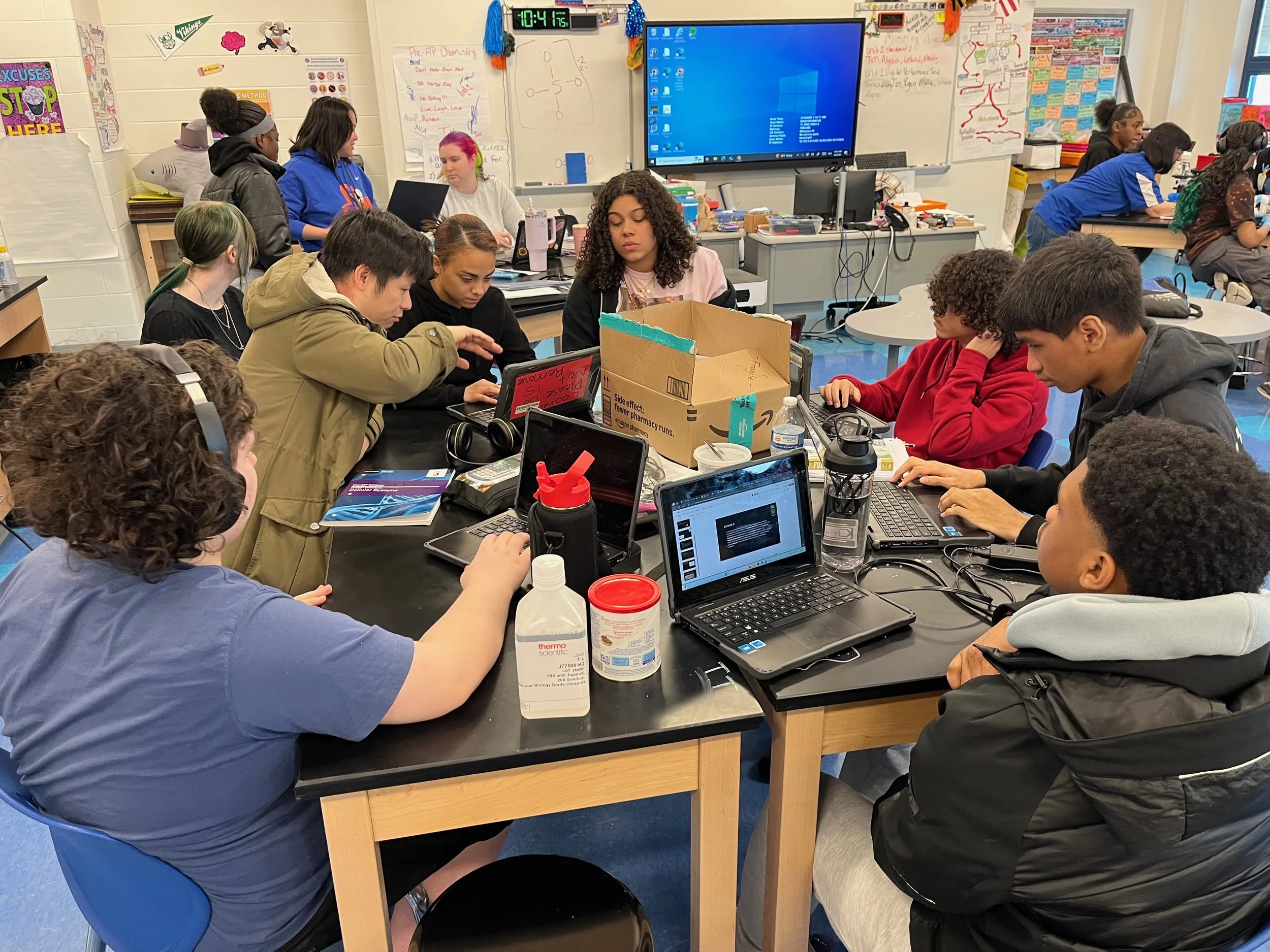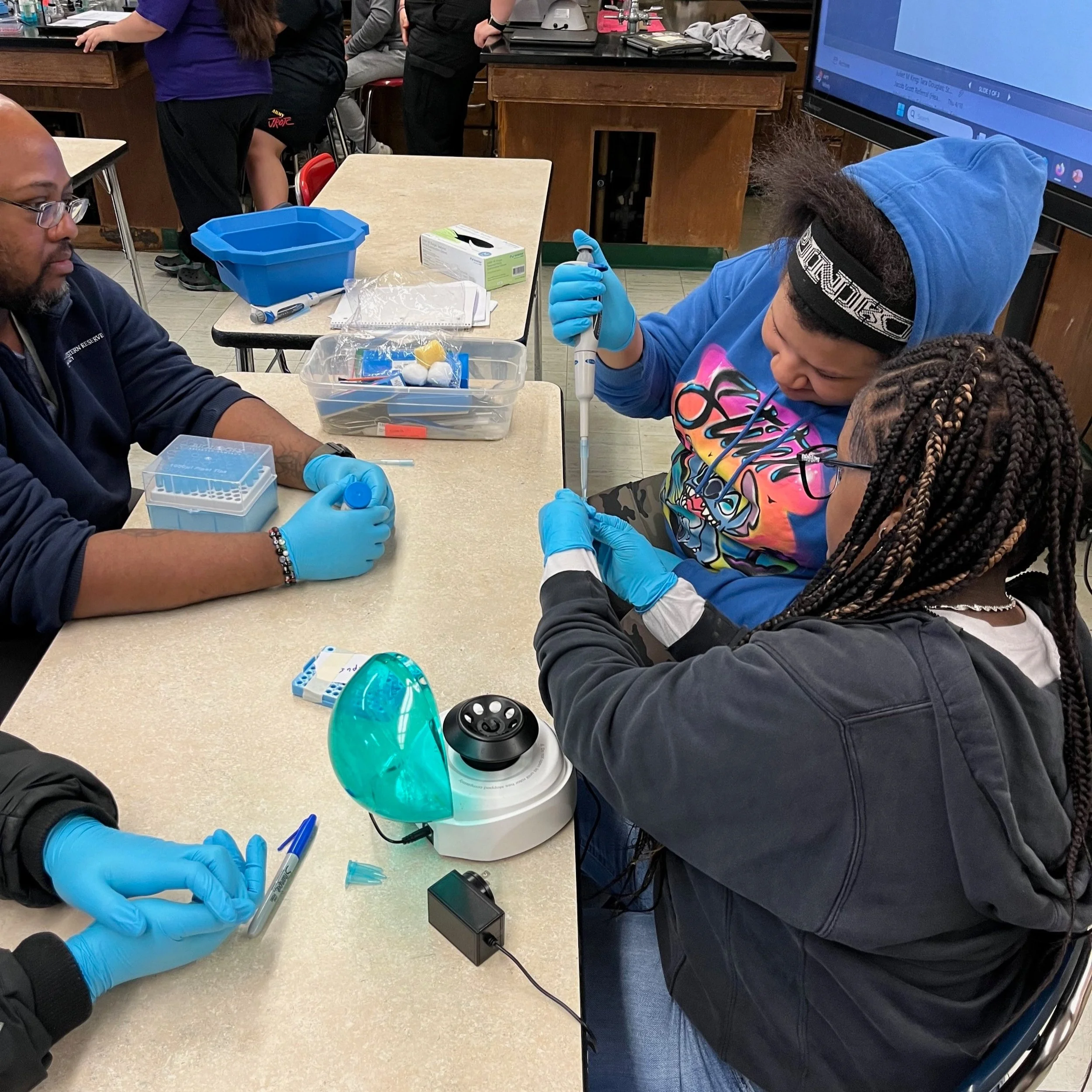April 2025
Working on presentations for the Student Symposium
Symposium season!
This school year has flown by, and we are fast approaching the culminating events of our Life as a Scientist program. Students at Lincoln-West and Garrett Morgan are hard at work on their presentations for the Young Scientist Symposiums that will be held at both schools. Following the events, students will be submitting their final manuscript for publication in the Journal of Young Scientists!
At the symposium, each student group will present an overview of their project, including their methods, data, results, and a discussion of the broader implications of their work. At the end of each presentation, the audience will have the opportunity to ask questions and hear more directly from the students.
These events are a joy to witness—students standing in front of their peers, teachers, Rise Up volunteers, and family members as the experts in their field of research. No one knows more about these projects than our students, and they should feel immensely proud!
Ways to Support the Event:
Attend: Come support these young scientists in person or online by engaging in the Q&A
Donate: We provide snacks and drinks to make the event feel festive. If you’d like to contribute soft drinks or snack items, please email us
Garrett Morgan Symposium
May 21st | 10:00 AM – 11:30 AM
In Person: 4600 Detroit Ave, Cleveland, OH 44102
Online: meet.google.com/rkv-wpdk-yfb
Lincoln-West Symposium
May 22nd | 10:00 AM – 12:00 PM
In Person: 3202 W 30th St, Cleveland, OH 44109
Online: meet.google.com/zgo-fwyv-vjk
Garrett Morgan update
We had an extremely productive April working with students at Garrett Morgan! These research groups have been focused on experiments for about 3.5 months and they are making great progress. Today we will highlight research group #42 Anesthesia.
CWRU faculty member and Rise Up volunteer Abdel guides students as they load a gel for a Western blot
Anesthesia is something many of us take for granted—whether it’s for dental work, surgeries, or emergency care. But what if being anesthetized multiple times could change how our brains and bodies function afterward? That’s the question behind this research project, which examines the behavioral and neurological effects of repeated anesthesia using fruit flies as a model.
What are they testing?
This project looks at the short-term and long-term effects of repeated anesthesia exposure across two major areas:
1. Behavior: Students measure how repeated exposure to anesthesia affects fruit fly behavior, including:
How long flies stay asleep after each exposure
Feeding behavior, by weighing food consumption
Sleep patterns, to see if natural rest cycles are disrupted
Activity and movement, using a climbing assay
Different groups of flies are exposed to anesthesia 0, 1, 2, or 3 times (or more). Each exposure lasts 10 seconds, with 10-minute breaks between treatments.
2. Brain Health: To understand the deeper effects on the nervous system, students run a Western blot test to detect (see photo above):
y-H2AX, a marker for DNA damage
APP (Amyloid Precursor Protein), linked to dementia in humans
These tests show whether repeated anesthesia may cause stress or degeneration in the brain.
Why This Research Matters
While anesthesia is a critical part of modern medicine, researchers are still studying how safe it is when used frequently or over long periods, especially in children, the elderly, and patients needing multiple procedures. This study gives students the opportunity to contribute to that scientific conversation by asking:
Does the brain bounce back after anesthesia?
Can repeated exposure lead to long-term behavioral or cellular changes?
Are some side effects subtle but important?
Answers to these questions could help improve patient safety, inform medical guidelines, and even shape how we monitor post-surgery recovery.
What’s Next?
As students gather data, they’ll be building graphs, analyzing protein levels, and drawing connections between what flies do and what might happen in more complex systems like our own. You can hear more at their symposium presentation on May 21st!
Student adding RIPA buffer to samples in preparation for molecular tests
Lincoln-West project highlight: #75 Lupus
This student proposal and funded project focuses on whether allergens impact insects and investigating immune and gut health in ants. Allergies and immune responses are usually thought of as a human concern—but what if the tiny creatures we share our environment with, like ants, also respond to allergens and bacteria in surprising ways? In this research project, students explore how ants react to common allergens (like moldy bread, peanut butter, and blue cheese) and exposure to bacteria (like E. coli). This study blends behavior, gut biology, and immune system science to explore how environmental stressors affect insect health and what they might mean for other organisms, including us.
What Are We Testing?
1. Behavior Changes: Students test whether exposure to allergens and bacteria affects ant movement and activity. Using Petri dishes marked with 1cm grids, students monitor how much each ant moves after being exposed to substances like:
Moldy bread
Blue cheese
Peanut butter
E. coli
Regular food (control)
Each week, students track movement patterns to see if activity increases, decreases, or changes based on the substance the ants consumed.
2. Gut Health Response: After collecting feces samples from ants each week, students measure levels of amylase, a digestive enzyme, using Western blotting. Changes in amylase levels may indicate how allergens or bacteria affect the digestive health of ants.
3. Immune System Activation: While ants don’t have adaptive immune systems like humans, they do have a powerful innate immune response. This test measures production of two key immune proteins:
PGRP-SC2, which detects bacterial cell walls
GNBP1, which binds to harmful bacteria
By performing qPCR and Western blot assays, students can determine whether these immune proteins increase in ants exposed to E. coli.
Why This Research Matters
This project gives students hands-on experience in fields ranging from microbiology to behavioral science to immunology. More importantly, it encourages them to ask big questions: Can allergens affect other species the same way they affect us? How do gut health and immunity interact in living organisms? Could ant responses to bacteria help us understand more about disease prevention?
The findings could spark further studies on how our environment and food systems affect more than just humans—and inspire new ways to protect insect and ecological health.
Ant housing!



